Genre Health & Fitness. Page - 2
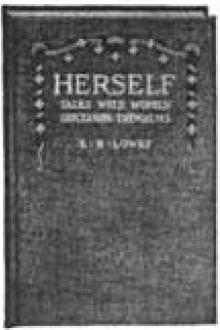
of the body, the development of the pelvis so that the hips become more prominent, and a change in the mental qualities of the child, the girl naturally becoming more retiring. The menstrual function usually is not established at once, there being premonitory symptoms of a vague nature. There may be, at first, only a slight discharge of mucus tinged with blood, later the normal menstrual flow will be established.
During this period of puberty there are great changes taking place in the girl's internal organs. This change and development requires considerable of the girl's strength and naturally influences her nervous system. It is for this reason that a girl at this period of her life should not be subjected to any great exertion, either physical or mental. She should have plenty of light, healthful exercise in the open air, but should not indulge in any very violent exercise. A little care at this time often will save her years of suffering. As the nervous system is greatly affected at this period the
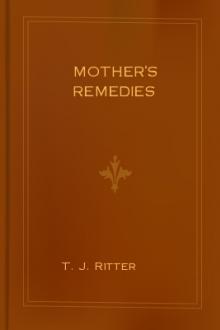
s plants of the genus Colchicum, such as the autumncrocus. The dried ripe seeds or corms (short thick solid food-storingunderground stem) of the autumn crocus which yield colchicine.
collodionHighly flammable, colorless or yellowish syrupy solution of pyroxylin,ether, and alcohol, used as an adhesive to close small wounds and holdsurgical dressings, in topical medications, and for making photographicplates.
colocynth (bitter apple)Old World vine (Citrullus colocynthis) bearing yellowish, green-mottledfruits the size of small lemons. The pulp of the fruit is a stronglaxative.
colombo (calumba)Root of an African plant (Jatrorrhiza palmata, family Menispermaceae)containing columbin; it is used as a tonic called calumba root orcolombo root.
colostrum (foremilk)Thin yellowish fluid secreted by the mammary glands at birth, rich inantibodies and minerals. It precedes the production of true milk.
coltsfoot (galax)Eurasian herb (Tussilago farfara), natural

of the children a conviction of the truth of what they say; while, on theother hand, those who, in theory at least, occupy the position thatthe direct falsifying of one's word is never justifiable, act at adisadvantage in attempting this method. For although, in practice, they areoften inclined to make an exception to their principles in regard to truthin the case of what is said to young children, they can not, after all,tell children what they know to be not true with that bold and confidentair necessary to carry full conviction to the children's minds. They areembarrassed by a kind of half guilty feeling, which, partially at least,betrays them, and the children do not really and fully believe what theysay. They can not suppose that their mother would really tell them whatshe knew was false, and yet they can not help perceiving that she does notspeak and look as if what she was saying was actually true.
Monsieur and Madame Croquemitaine.
In all countries there are many,

out from 3 to 8 grams of sugar a day. By the old method we could not do away with the last traces of sugar.
The Allen treatment was started with two starvation days. On the second he was sugar-free--but showed 2.6 grams of sugar the following day on 12 grams of carbohydrate and 40 grams of protein. (This was one of the earlier cases when the diet was raised too quickly after starvation.) After one more starvation day and two vegetable days he stayed sugar-free while the diet was raised slowly to 30 grams of carbohydrate and 45 grams of protein, calories about 2000. Discharged sugar-free on this diet.
Weight at entrance, 109 pounds. Weight at discharge, 110 pounds.
* * * * *
Case 3. A man of 35, a severe diabetic, entered Dec. 28, 1914. He had been in the hospital the previous July for a month and could never be made sugar-free with the old method of treatment. At entrance he was putting out 2.5% of sugar (135 grams) per day with strongly positive acetone and diacetic acid tests. Tw

s which are performed by Conjurations, are neither Natural nor Supernatural, but Diabolical, belonging unto Sorcery, and are prohibited all good Christians; so likewise all those Means which oppose Holy Writ, Gods Word and Commandments, are to be rejected and refuted by true Natural Cabalists; I say this, because a certain distinction and sure order ought to be found of the Natural, Supernatural, Unnatural things.
In like manner there appertains unto Supernatural things, all the Water-Spirits, as the Syrens, Succubi, & other Water-Nymphs, with their Relations, as likewise the Terrestrial Spirits, and those which inhabit the Air, who sometimes are heard, seen, or perceived, sometimes foretelling Death or other Disasters, sometimes they discover by their Apparition Riches and good Fortune in certain places, and the Fiery Spirits appertain here also, which appear in a fiery shape, or like a burning Light; all these are Spirits having untangible Bodies, yet are they not such Spirits a
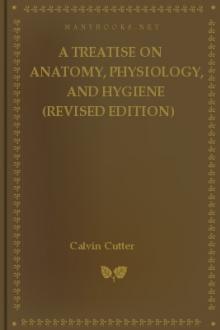
ionally in all directions, while plants grow upwards and downwards from a collet only. The food of animals is organic, while that of plants is inorganic; the latter feeding entirely upon the elements of the soil and atmosphere, while the former subsist upon the products of the animal and vegetable kingdoms. The size of the vegetable is in most cases limited only by the duration of existence, as a tree continues to put forth new branches during each period of its life, while the animal, at a certain time of life, attains the average size of its species.
13. One of the most important distinctions between animals and plants, is the different effects of respiration. Animals consume the oxygen of the atmosphere, and give off carbonic acid; while plants take up the carbonic acid, and restore to animals the oxygen, thus affording an admirable example of the principle of compensation in nature.
14. But the decisive distinctions between animals and plants are
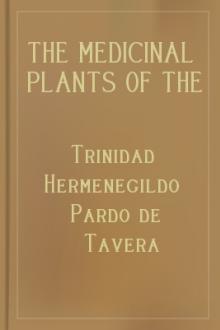
h, Dysoxylum Blancoi, Sandoricum Indicum, Carapa Moluccensis, Cedrela Toona 75-80 Celastraceæ--Celastrus paniculata 80-81 Rhamnaceæ--Zizyphus Jujuba, Rhamnus Wightii 81-82 Anacardiaceæ--Mangifera Indica, Anacardium occidentale, Odina Wodier 82-86 Moringeæ--Moringa pterygosperma 86-88 Leguminosæ (Papilionaceæ)--Agati grandiflora, Abrus precatorius, Mucuna pruriens, Erythrina Indica, Clitoria ternatea, Pterocarpus santalinus, P. Indicus, P. erinaceus, Pongamia glabra 88-95 Leguminosæ (Cæsalpineæ)--Cæsalpinia Bonducella, C. Sappan, C. pulcherrima, Cassia fistula, C. occidentalis, C. alata, Tamarindus Indica, Bauhinia malabarica 96-106 Leguminosæ (Mimoseæ)--Entada scandens, Parkia Roxburghii, Acacia Farnesiana 106-109 Crassulaceæ--Kalanchoe laciniata 109-110 Combretaceæ--Terminalia Catappa, T. Chebula, Quisqualis Indica 110-113 Myrtaceæ--Psidium pomiferum, Eugenia Jambolana 113-116 Melastomaceæ--Melastoma malabatrichum
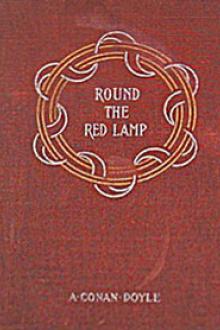
is very hard of hearing, so that it makes little difference whether he uses it or not.
He reads, as a duty, his weekly medical paper, so that he has a general idea as to the advance of modern science. He always persists in looking upon it as a huge and rather ludicrous experiment. The germ theory of disease set him chuckling for a long time, and his favourite joke in the sick room was to say, "Shut the door or the germs will be getting in." As to the Darwinian theory, it struck him as being the crowning joke of the century. "The children in the nursery and the ancestors in the stable," he would cry, and laugh the tears out of his eyes.
He is so very much behind the day that occasionally, as things move round in their usual circle, he finds himself, to his bewilderment, in the front of the fashion. Dietetic treatment, for example, had been much in vogue in his youth, and he has more practical knowledge of it than any one whom I have met. Massage, too, was familiar to him when it was new to our ge
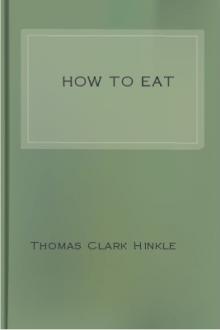
malady. I have staggered in black despair with staring eyes and bleeding feet and crying soul along this road strewn with thorns and stones. I know what it is to lie awake all night and cry like a baby, with none to know and none to tell me what to do. I know what it is to be tremendously ambitious. Ambition! Ambition! Ah, God of Heaven! How a poor soul suffers who beyond everything else, craves to be able to do something big in this world because he knows he should, yet is held down by this dreadful thing, "nerves!" And how little, how unspeakably little, do physicians, even the greatest of them, know, actually know, how we suffer, unless indeed there be one in whose own body the fiend has sunk deep its talons.
After I had my first breakdown I made up my mind to study medicine because something told me that I was one of those "peculiar" people who just think there is something the matter with them. Is it not strange that with all the advance that has been made in general medicine, little or n
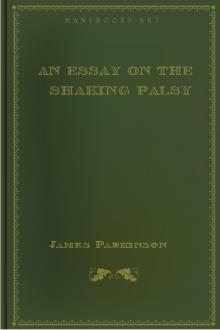
rembling of the arms about five years before. His application was on account of a considerable degree of inflammation over the lower ribs on the left side, which terminated in the formation of matter beneath the fascia. About a pint was removed on making the necessary opening; and a considerable quantity discharged daily for two or three weeks. On his recovery from this, no change appeared to have taken place in his original complaint; and the opportunity of learning its future progress was lost by his removal to a distant part of the country.
CASE V.
In another case, the particulars of which could not be obtained, and the gentleman, the lamented subject of which was only seen at a distance, one of the characteristic symptoms of this malady, the inability for motion, except in a running pace, appeared to exist in an extraordinary degree. It seemed to be necessary that the gentleman should be supported by his attendant, standing before him with a hand placed on each shoulder, until, by gently swa